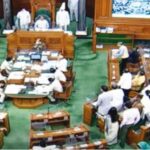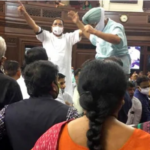CJI NV Ramana lamented the “sorry state of affairs” of lawmaking and parliamentary debate. But it is not the hasty passage of a bill that’s at fault, but the rush to introduce it in Parliament that makes careful drafting a casualty.
This year on the occasion of the 75th Independence Day celebrations held at the Supreme Court lawns, Chief Justice of India (CJI) NV Ramana lamented the “sorry state of affairs” of lawmaking and parliamentary debate in the country. He observed: “We see a lot of gaps in legislation, there is a lot of ambiguity in making laws.” In the absence of quality debate, courts are unable to fathom the intent and object of new laws, triggering litigation and causing inconvenience to the stakeholders, he added.
This was a scathing indictment of process, procedures and personalities. The comment was made against the backdrop of the dubious distinction of legislative achievements during the monsoon session this year. The session, which began on July 19 and was expected to conclude on August 13 with 20 sittings, ended prematurely amidst din and chaos.
Despite this, the Lok Sabha passed 22 bills and the Rajya Sabha, 21, including two money bills. Of these, 21 bills were passed during this session itself by both Houses. One extra bill passed by the Lok Sabha was passed in the Rajya Sabha during the previous session. One of the Bills passed related to a constitutional amendment, since numbered 105th Constitutional Amendment after the president’s assent. Six of the bills passed by the two Houses pertained to ordinances promulgated by the president in the preceding intersession period. Only one of the bills passed had been through the portals of a Department Related Parliamentary Standing Committee (DRPSC).
According to the bulletin issued by the Rajya Sabha Secretariat, on August 11 when the House saw forgettable scenes of ungainly tussle between the members and the security personnel during the passage of the controversial General Insurance Business (Nationalisation) Amendment Bill, 2021, the Constitutional Amendment Bill was passed. The House also gave a nod to three other bills and transacted other official business, the cumulative record of which ran into 22 pages.
However, this express delivery of legislative business is not a singularity. In August 2019, before the euphoria over the reading down of Article 370 relating to the status of J&K had subsided, came the claim, universally, but grudgingly acknowledged by some, that the first session of the 17th Lok Sabha and the corresponding 249th session of the Rajya Sabha during June-August 2019 had been the most “productive”. M Venkaiah Naidu, Chairman, Rajya Sabha, in his valedictory address on August 7, 2019, highlighted that in terms of legislative output, with the passage of 32 Bills during 35 sittings, the 249th session was the best in the last 17 years, accounting for 52 sessions. This was surpassed by 35 bills being passed during the 197th session in 2002. Similarly, the Speaker of the Lok Sabha, in his valedictory remarks stated that 36 bills were passed during the First Session of the 17th Lok Sabha.
However, not all saw it that way. Some leaders of the opposition in the Rajya Sabha presented a letter to the Chairman on July 25, 2019, objecting to the “hurried” passage of Bills without adequate scrutiny in the ongoing Parliament session. Derek O’Brien of the Trinamool Congress observed: “Three days, three Bills. It’s like delivering pizza.”
Again in 2016, a news item took all by surprise momentarily. “In rarest of rare case, both LS and RS pass a Bill in one day,” read a newspaper headline on May 13, 2016. Both the Houses on the same day passed the Rajendra Prasad Central University Bill. Even President Pranab Mukherjee, hold your breath, reportedly gave his assent to it the same day. It was indeed a rarity, if not a singularity again.
Why did this occurrence invite so much attention and was termed as the “rarest of rare case”, a phrase normally used in the context of a court awarding the death sentence? A close look at the rules and procedures prescribed for consideration and passage of a bill in Parliament would bring home the uniqueness of the phenomenon, perhaps fit for entry in the Guinness Book of Records.
To begin with, there are certain formalities to be completed before a bill reaches the portals of Parliament. The ministry in-charge of the legislation has to get the proposal formulated in consultation with other concerned ministries, including, of course, the law ministry. A note for the cabinet has to be prepared, enclosing the draft of the bill, in several cases. After the approval of the cabinet, the minister in-charge has to send a notice to the Presiding Officer (Speaker, Lok Sabha or the Chairman, Rajya Sabha, as the case may be) of the House in which he wants the bill to be introduced after a session of the Parliament has been summoned.
When the session begins, the minister sends a request for listing of the bill. Copies of the proposed bill have to be printed and circulated to the members at least two days in advance of its introduction. According to the normal practice, after introduction, the bill is referred to the DRPSC for examination and report. If a minister, for some very cogent reasons, wants the bill to be taken up for consideration immediately, he has to make a specific request to the Presiding Officer, who, in consultation with the leaders of other important parties, grants permission.
If for some reason, permission is not forthcoming, the bill is sent to the Standing Committee, which is normally given three months to present its report. After the report is laid on the table of both Houses, a copy of it is sent to the minister in-charge for consideration. In case of changes, after the approval of the cabinet, the minister in-charge gives a notice to the Presiding Officer for listing the bill for consideration and passing. The Business Advisory Committee of that House allots a specific time (in hours/minutes) for the purpose. The Bill is accordingly put on the List of Business for consideration and passing on a particular day, taking into consideration the priority in the House. Amendments to the Bill, moved either by the government or private members, too have to be circulated in advance. Technically speaking, this procedure constitutes three readings of the bill in the House—introduction, general discussion, clause by clause consideration—followed by its formal passage.
After that, a message saying the bill has been passed is required to be transmitted by the Secretary-General of the House to his counterpart in the other House and it has to be read out during the sitting of that other House. Thereafter, the procedure for consideration and passing remains more or less the same. In case, the second House approves any fresh amendments to the bill, it has to be sent back to the first House for further approval. After the bill has been passed by both Houses, it is sent by the Presiding Officer of the second House for obtaining the assent of the president through the law ministry. After the president’s approval, the bill is notified in the Gazette.
Completing all these formalities in one day is an impossibility. But it can be done with the explicit or implicit “cooperation” of all stakeholders, including granting of exemptions from meeting certain requirements. A bill a day or 22 bills in 18 days is, however, not what the framers of the Constitution and the Committees on Rules of the two Houses had envisioned while prescribing the meticulous legislative procedure.
Although there is definitely merit in the opening observations of the CJI about the quality of legislations and its organic link to the parliamentary debate, what are the counterfactual arguments? First and foremost, each bill is accompanied by a Statement of Objects and Reasons, which explains, at some length, the intent and object as well as the purpose of the bill under consideration. In the absence of clarity in the legislation, the courts often refer to this Statement. Moreover, much depends on careful drafting of the law. Thus often, it is not the hasty passage of a bill that is at fault, but the haste to introduce it in Parliament that makes its careful drafting a casualty.
Further, the Tenth Schedule of the Constitution, popularly known as the anti-defection law, lists two grounds on which a legislator can be disqualified for defection. One, if he voluntarily gives up membership of his political party, and two, if he votes or abstains from voting in the House contrary to any direction issued by his party. The second provision has the effect of preventing the members from speaking out their mind. What was intended to prevent body shopping of legislators has ended up silencing them. Of course, with the permission of the party, a member may defy the party whip, but it rarely happens. During the dawn of Independence, however, whips used to be issued to Congress party members in the Constituent Assembly, but that did not silence everyone. Shibban Lal Saksena frequently spoke in defiance of it and was, apparently never punished for the delinquency.
The Indian Parliament today is also very different from parliaments in other parts of the world. For instance, in the UK and the US, individual legislators frequently dissent over bills and even policies of their party leadership, and sometimes force changes. It is unlikely to happen in India unless the party breaks up and the dissenters are in two-thirds majority.
However, all is not lost. The proceedings of the Committees of the Indian Parliament are neither telecast nor their discussions subject to whip. The members speak freely therein, unfettered by political compulsion. The Committees also have the benefit of wide-ranging consultations with professionals and experts and hence, produce reports which are well considered and a healthy alternative to informed parliamentary debates. However, as we have seen, reference to the DRPSC is not mandatory and lies within the ambit of the discretionary powers of the Presiding Officer of the House in which the bill is introduced. It is another matter that after it is passed by one House without reference to a DRPSC, the other House may still refer it to a Select Committee. But that does not happen most of the time. It did not happen even in a single case in the recently concluded Parliament session. The move of the opposition in the Rajya to do so in the case of the General Insurance Business (Nationalisation) Amendment Bill, 2021, was lost in commotion even before it was rejected by 79 votes to 44.
In order, therefore, to ensure proper scrutiny of bills, the Rules of Procedure of the two Houses need some modification. At present, after a Bill is introduced in the House, the Presiding Officer takes a call on referring it to the concerned DRPSC. Often, on a request made by the concerned minister, for reasons of urgency or otherwise, the bill is taken up for consideration and passing in the House without reference to the DRPSC. By making suitable amendments to the Rules, all new bills should automatically stand referred to the DRPSC. As far as urgent bills or those amending existing statutes are concerned, the decision not to refer them to the DRPSC should be taken by the full House.
—The writer was Secretary, Parliamentary Affairs from 2003-2005 and Secretary General of Rajya Sabha from 2007-2012


